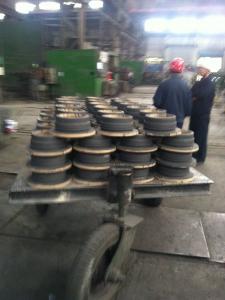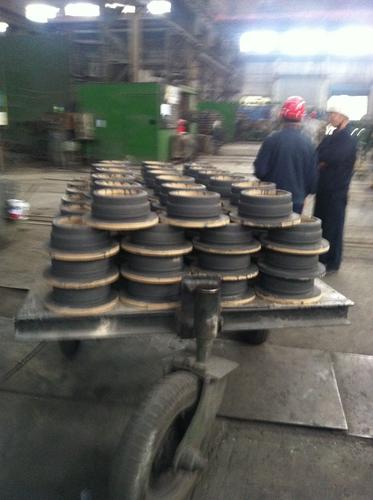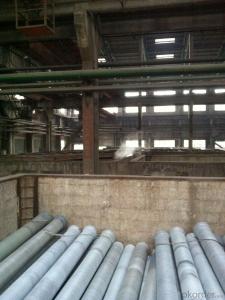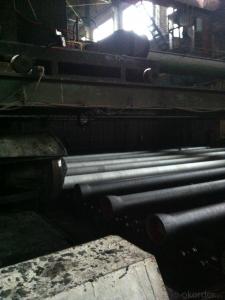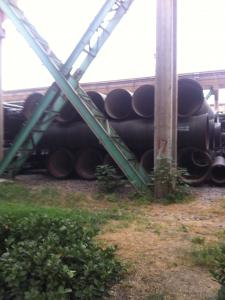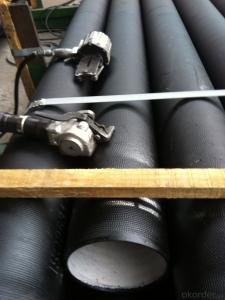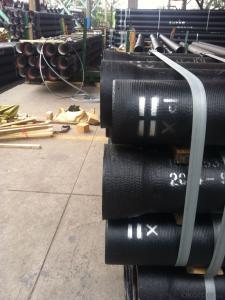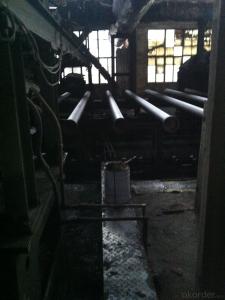DUCTILE IRON PIPES AND PIPE FITTINGS K9 CLASS DN450
- Loading Port:
- Tianjin
- Payment Terms:
- TT OR LC
- Min Order Qty:
- 22 pc
- Supply Capability:
- 3000 pc/month
OKorder Service Pledge
OKorder Financial Service
You Might Also Like
Material : Ductile Cast Iron
Size Range : DN 80mm to DN 2000mm
Unit Effective Length : 6m or 5.7m
Manufacture Standard: ISO 2531:1998/ EN 545:2006/EN 598:2007
Annual capacity : 200,000 tons
Coating Exterior: Zinc 130g/m2 according to ISO 8179-1 and bitumen coating 70 microns.
Cement Interior: Portland Cement/ High Alumina Cement/ Sulphate Resisting Cement Lining according to ISO 4179
Special requirements on external coating and internal lining can be applied
We also provide accessories such as SBR/EPDM rubber gaskets, lubricant paste, pipe caps, PE sleeves, etc.
Additional Parts:
Each pipe is strictly inspected according to related standard to ensure permanently high performance.
Easy Installation at site and service free for life
Long Service Lifespan
Quotation will arrive you within 24hours once we get your inquiry.
We guarantee offering you a competitive price.
A copy of original inspection reports of pipes will be offered after shipment.
Photos of loading process will be sent to the customer after shipment effect.
We will follow-up the delivery progress after shipment effect and update to the customer on weekly basis.
- Q: How does ductile iron pipe handle soil movements and settlements?
- Ductile iron pipe is known for its ability to handle soil movements and settlements effectively. The material's flexibility and durability make it suitable for accommodating ground shifts and settling without compromising its structural integrity. One key characteristic of ductile iron pipe is its inherent strength and resilience. It can withstand external pressures and stress caused by soil movements, such as lateral forces and ground settlement. This is due to its high tensile strength, which allows it to resist deformation and maintain its shape even under significant loads. Moreover, ductile iron pipe's flexibility plays a vital role in its ability to handle soil movements. The pipe's inherent flexibility allows it to absorb the effects of ground shifts and movements without fracturing or breaking. It can bend and adapt to changes in the surrounding soil, reducing the risk of pipe failure or leakage. Additionally, ductile iron pipe's joint design contributes to its effectiveness in handling soil movements and settlements. The push-on joint system used in ductile iron pipe installation allows for some movement and settlement without compromising the overall integrity of the pipeline. The joints can absorb and distribute stress and movement, reducing the risk of pipe failure. In conclusion, ductile iron pipe is highly capable of handling soil movements and settlements. Its strength, flexibility, and joint design allow it to withstand external pressures caused by ground shifts, settling, and other soil movements. This makes ductile iron pipe a reliable choice for various applications where soil movement is a concern.
- Q: Are ductile iron pipes resistant to acid attacks?
- Generally, ductile iron pipes exhibit resistance to acid attacks. Ductile iron, a form of cast iron which has undergone magnesium treatment to enhance its strength and ductility, produces a more durable material capable of withstanding corrosive conditions, including acids. Nevertheless, it is crucial to acknowledge that the resistance level may vary depending on the specific acid type and concentration involved. In highly corrosive environments, where powerful acids or high concentrations are present, it may be necessary to implement additional protective measures such as applying a lining or coating to the pipes. Moreover, regular inspection and maintenance are vital to ensure the long-term durability and resistance of ductile iron pipes.
- Q: Are ductile iron pipes resistant to chemical attacks?
- Yes, ductile iron pipes are generally resistant to chemical attacks. Ductile iron is known for its high corrosion resistance, making it suitable for a wide range of applications including water and wastewater systems. Ductile iron pipes are typically lined with a protective coating such as cement mortar or epoxy to further enhance their resistance to chemical attacks. This lining acts as a barrier between the pipe material and the corrosive substances, preventing any degradation of the iron. However, it is important to note that the level of resistance can vary depending on the specific chemical being transported and the concentration and temperature of the solution. Therefore, it is always advisable to consult with experts or engineers to ensure the suitability of ductile iron pipes for specific chemical environments.
- Q: Are ductile iron pipes suitable for trenchless pipe ramming installations?
- Yes, ductile iron pipes are suitable for trenchless pipe ramming installations. They possess the necessary strength and flexibility to withstand the impact and vibrations caused during the ramming process. Additionally, their corrosion resistance and durability make them a reliable choice for trenchless installations, ensuring long-term performance and minimal maintenance requirements.
- Q: What is the excavation width of ductile iron pipes with diameters greater than 1400?
- Then, according to the soil characteristics, different slopes are calculated, and the width of the excavation is calculated according to the depth and slopeIf the soil is soft, high water content and easy to collapse, the excavation width will be wide, otherwise the slope will be steep and the excavation width will be narrow
- Q: Are ductile iron pipes suitable for acidic or alkaline environments?
- Yes, ductile iron pipes are suitable for both acidic and alkaline environments. They have excellent resistance to corrosion, making them a reliable choice for transporting fluids in a wide range of pH levels.
- Q: Are ductile iron pipes suitable for underground applications?
- Yes, ductile iron pipes are suitable for underground applications. Ductile iron pipes are known for their durability, strength, and corrosion resistance, making them an ideal choice for underground installations. These pipes can withstand heavy loads, ground movement, and external pressure, making them suitable for burying underground. Additionally, ductile iron pipes have a long lifespan, often lasting more than 100 years, which is crucial for underground applications where accessibility and maintenance can be challenging. Overall, their robustness and longevity make ductile iron pipes a reliable and suitable choice for underground applications.
- Q: Can ductile iron pipes be used for underground chemical processing systems?
- No, ductile iron pipes are not suitable for underground chemical processing systems as they can corrode and react with certain chemicals, compromising the integrity of the system.
- Q: Can ductile iron pipes be used in tunneling or microtunneling projects?
- Yes, ductile iron pipes can be used in tunneling or microtunneling projects. Ductile iron pipes are known for their durability, strength, and resistance to corrosion, making them suitable for underground applications. They can handle the pressure and load requirements of tunneling projects and provide reliable and long-lasting performance.
- Q: Are ductile iron pipes suitable for use in oil refineries?
- Yes, ductile iron pipes are suitable for use in oil refineries. They have excellent corrosion resistance and high tensile strength, making them ideal for transporting various fluids and gases in harsh environments such as oil refineries. Additionally, their flexibility and durability allow for easy installation and maintenance, ensuring reliable operations in refinery facilities.
Send your message to us
DUCTILE IRON PIPES AND PIPE FITTINGS K9 CLASS DN450
- Loading Port:
- Tianjin
- Payment Terms:
- TT OR LC
- Min Order Qty:
- 22 pc
- Supply Capability:
- 3000 pc/month
OKorder Service Pledge
OKorder Financial Service
Similar products
Hot products
Hot Searches
Related keywords
